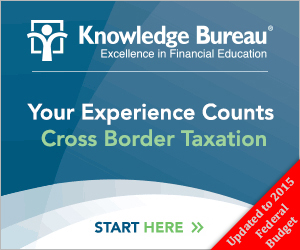Last updated: October 06 2015
FATCA is Here for Good

The first transfer of Canadian banking information to the Internal Revenue Service was completed September 30, as reported last week. That was the result of a September 16 appeal in which The Honourable Mr. Justice Martineau of the Canadian Federal Court in Vancouver ruled that the U.S. Foreign Account Tax Compliance Act (FATCA) legislation is both legal under Canadian law and not inconsistent with the U.S./Canada Tax Treaty.
Therefore, injunctive relief was not provided and the implementation of the information transfer went ahead.
Whether the judge disagreed with the far reaching implications of the FATCA is not relevant; his task was simply to determine whether the U.S. legislation was in violation of the law. The judge’s ruling confirmed that all due diligence had been completed by the Government of Canada and the exchange of information would proceed. He did, however, dismiss the case without prejudice, so the plaintiffs can file again in a higher court should they choose to continue the fight.
This inter-governmental agreement requires that Canadian banks perform an electronic scan of their databases, looking for certain types of information that will help to identify Americans 9such as birth in the U.S., U.S. phone numbers, money transfers to the U.S., etc.). When one of these U.S. indices pops up, the bank will request self-certification by the account holder that they are not a U.S. citizen or resident, as well as other documentary evidence to support the claim. Unless the account holder can prove non-U.S. status, the release of account information will occur.
FATCA is not all one-sided. Canada will also receive the banking information of Canadians in the U.S. Therefore, snowbirds and other investors need to make sure they are claiming all their income as well as reporting on Form T1135 when the threshold is met.
Many Americans residing in Canada have already had their account information released to the IRS and, if they are not currently compliant with all IRS tax and information reporting, now would be a really good time to contact a tax specialist who understands the U.S. tax code as it relates to taxpayers with foreign assets.
 |
While the IRS has been on a mission to collect revenues from tax evaders, they also realize that Canada is not a tax haven and that many honest people are caught up in the regulations that require disclosure of their foreign accounts and other assets (or risk very large penalties). In response they have created guidelines and programs to allow non-filers to come into full compliance with no penalties.
The Streamlined Foreign Offshore Program entails the filing of three years of tax and information returns and six years of Foreign Bank Account Reports (FBAR) in addition to certain other forms and statements. This program can be closed at any time without notice, so if you are considering coming clean before the IRS finds you, don’t wait too long.
Mary Beth Lougen, EA USTCP, is the President of American Expat Taxes.
ADDITIONAL EDUCATIONAL RESOURCES: The Cross Border Taxation Course from Knowledge Bureau.
